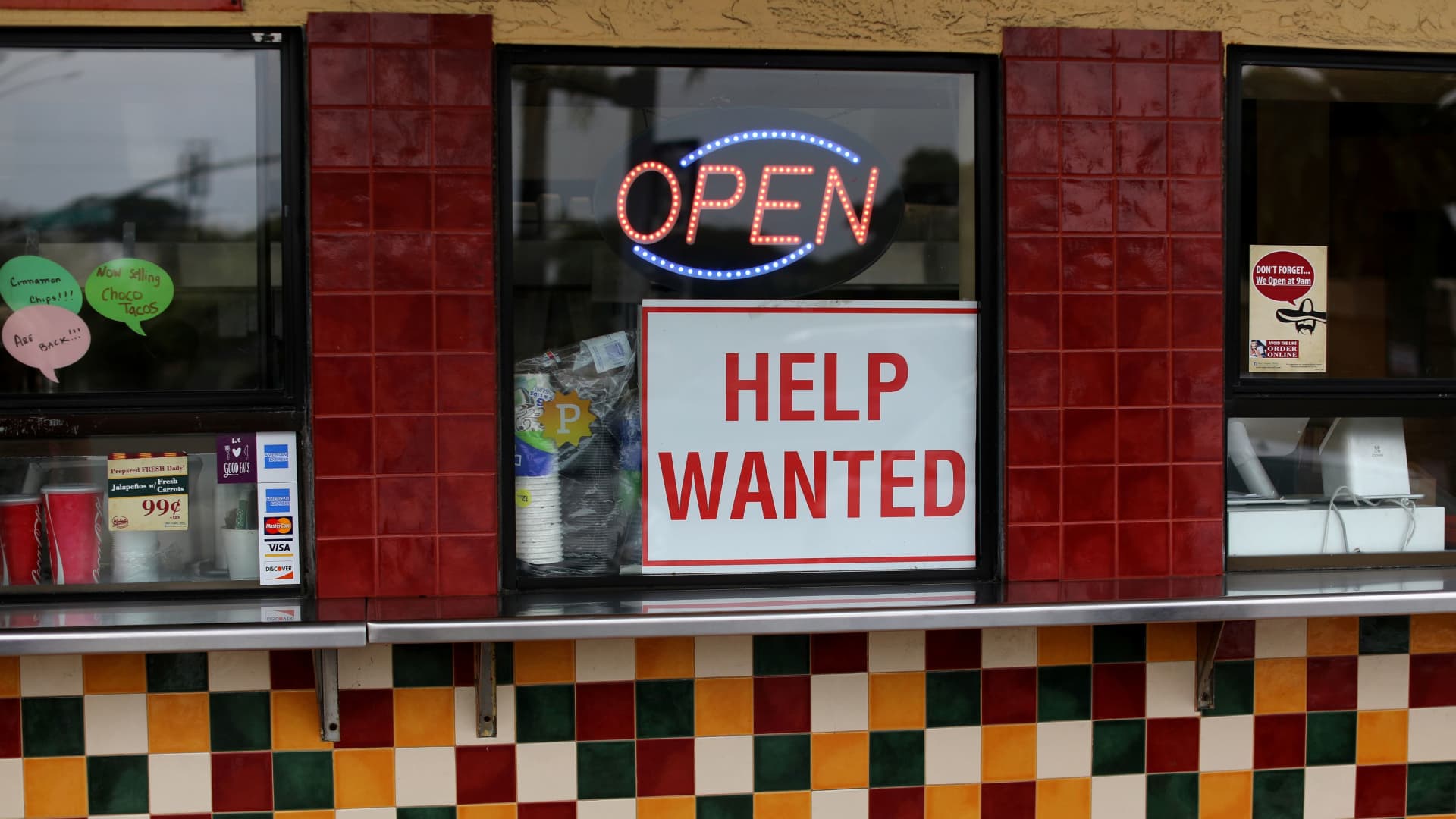U. S. Chamber of commerce blames weak jobs report on enhanced unemployment benefit, kicks off lobbying effort
- Select a language for the TTS:
- UK English Female
- UK English Male
- US English Female
- US English Male
- Australian Female
- Australian Male
- Language selected: (auto detect) - EN

Play all audios:

A help wanted sign is posted at a taco stand in Solana Beach, California. Mike Blake | Reuters The largest business lobbying group in America on Friday blamed a $300-per-week federal jobless
benefit for enticing Americans to stay at home and April's far-weaker-than-expected jobs report. "The disappointing jobs report makes it clear that paying people not to work is
dampening what should be a stronger jobs market," the U.S. Chamber of Commerce said in the hours after the Labor Department released its April 2021 employment report. "One step
policymakers should take now is ending the $300 weekly supplemental unemployment benefit," the lobbying group added. "Based on the Chamber's analysis, the $300 benefit results
in approximately one in four recipients taking home more in unemployment than they earned working." A Chamber spokesperson confirmed to CNBC that it will be using similar messaging to
lobby the White House and Capitol Hill to end the payout. The group's attack against the federal unemployment benefit came hours after the Labor Department reported that total nonfarm
payroll employment rose by 266,000 last month, far below the 1 million expected by economists polled by Dow Jones. READ MORE CNBC POLITICS COVERAGE * Bessent floats extending tariff pause
for countries in 'good faith' trade talks * Fulbright board quits, claims Trump administration politicized scholarships * U.S. tariffs on China won't change again, Lutnick
says after trade talks * Trump says China will supply rare earths in 'done' deal * Fund managers lobby Congress over Section 899 to avert foreign investors leaving the U.S. * Trump
authorizes deploying 2,000 more National Guard troops to LA * 'Trump accounts' for newborns: President, CEOs promote savings plans * China and U.S. set to continue trade talks as
Trump touts 'good reports' from London * Speaker Johnson hopes Musk and Trump can 'reconcile' after public fallout The Biden administration has pushed back on arguments
like the Chamber's. Appearing on CNBC on Friday, Labor Secretary Marty Walsh rejected arguments made by Republicans and business groups that the enhanced unemployment benefits are
encouraging potential workers to stay home. Treasury Secretary Janet Yellen also panned such critiques and told reporters Friday afternoon that she doesn't think the addition to
unemployment benefits "is really the factor that is making a difference." "When you look across states, or across sectors, or across workers, if it were really the extra
benefits that were holding back hiring, you'd expect to see that either in states, or for workers in or sectors where the replacement rate due to [unemployment insurance] is very high —
you'd expect to see lower job-finding rates," she said. "And, in fact, what you see is the exact opposite." Rep. Ilhan Omar, a Democrat from Minnesota, offered a cynical
view of the Chamber's criticism of the $300-a-week benefit. For much of the past year, millions of unemployed Americans have qualified for a special federal jobless benefit to help
replace income lost as a result of layoffs during the Covid-19 pandemic. The first such federal jobless benefit began under former President Donald Trump in March 2020, when he signed the
CARES Act. That law provided unemployed Americans with a $600 weekly supplement, which in many cases was greater income than workers received while employed full time. Sen. Bernie Sanders,
I-Vt., countered that corporations should instead be paying their workers higher wages. President Joe Biden's $1.9 trillion American Rescue Plan, signed into law in March, provides
unemployment payments of $300 per week. Without any additional government intervention, that benefit will expire in early September. Some economists and many Republicans have blamed the
benefit for discouraging Americans from returning to the jobs they held before the pandemic. South Carolina Gov. Henry McMaster, for example, earlier this week ordered the state's
Department of Employment and Workforce to withdraw from the federal government's pandemic programs by the end of June. "This labor shortage is being created in large part by the
supplemental unemployment payments that the federal government provides claimants on top of their state unemployment benefits," McMaster said in a press release dated Thursday.
"What was intended to be a short-term financial assistance for the vulnerable and displaced during the height of the pandemic has turned into a dangerous federal entitlement,
incentivizing and paying workers to stay at home rather than encouraging them to return to the workplace," he added.